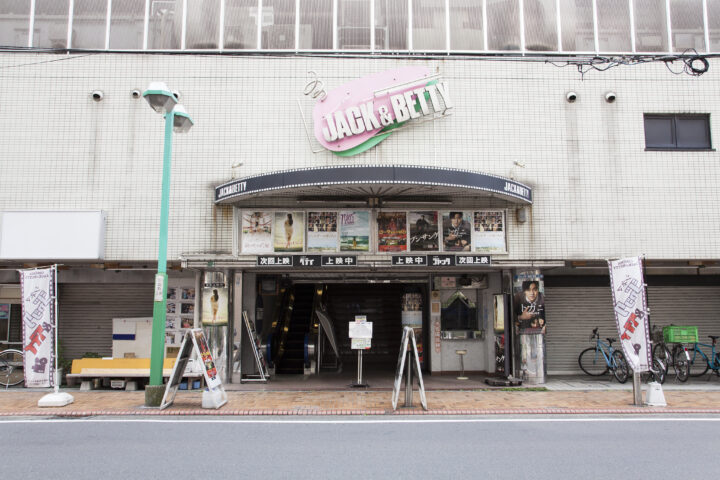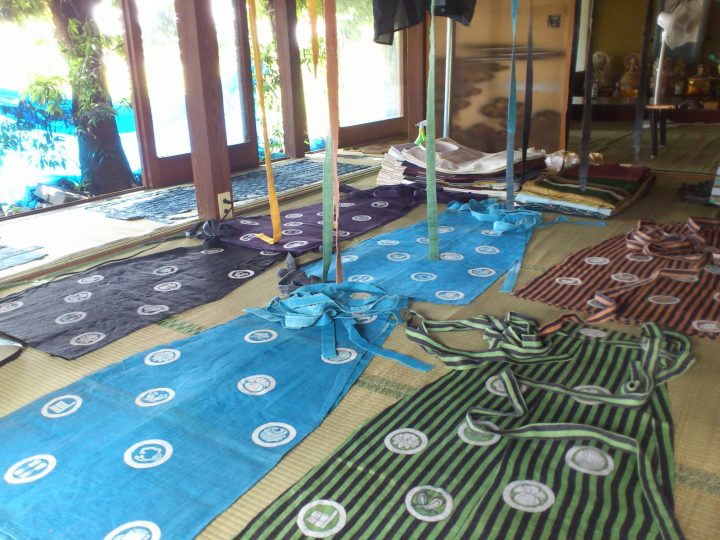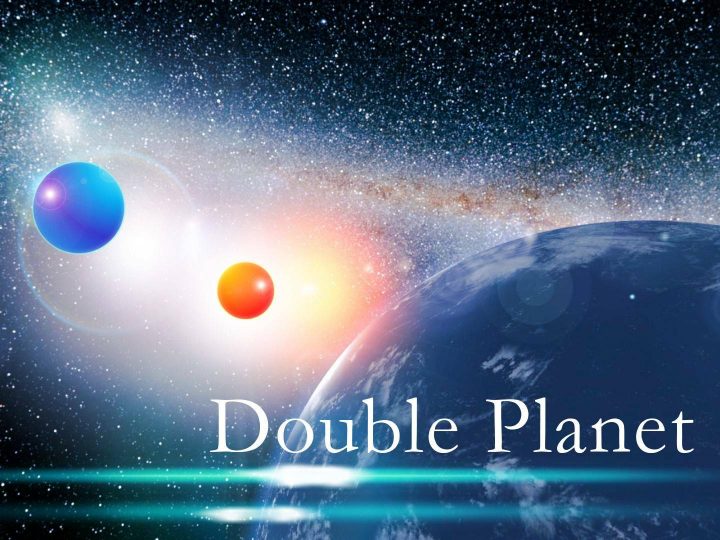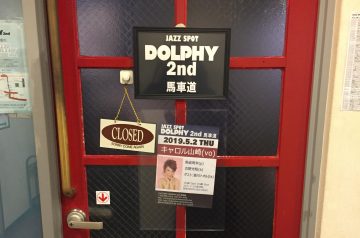Interview with Satoko Shibata
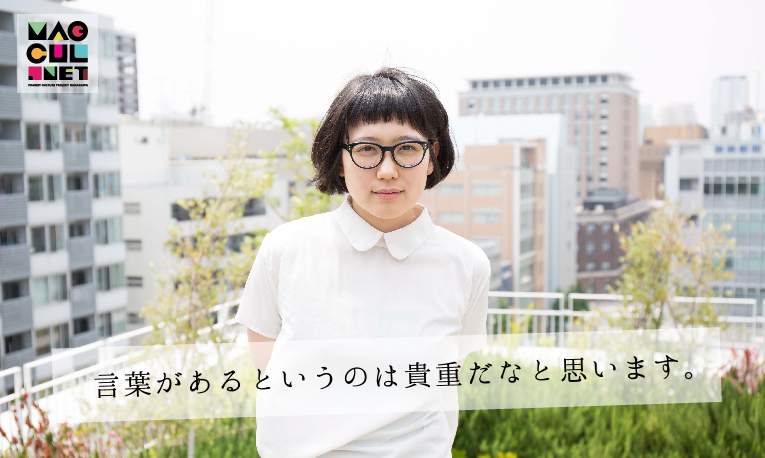
Interview & photo: Masanobu Nishino
Text by Akiko Inoue
Impressions of Yokohama
— Mr. Shibata, you currently live in Kogane-cho. What are your honest impressions of Kogane-cho and Yokohama?
Shibata: I really love it. I'm from Hokkaido, but after going to school in Tokyo and moving to Kochi, Yokohama is my favorite city. It's a bit like a regional city, and there are some shady places nearby, so I think it's nice.
- After graduating from university, you worked in Kochi for half a year, then came back here. Why did you choose Yokohama instead of Tokyo?
Shibata: Originally, I didn't really want to live in Tokyo. I thought Yokohama was nice. And I found a place with really cheap rent.
It's thanks to that that I'm able to do what I do now.
About the second album currently in production following the first album "Shibata Satoko Island"
"I think I was just floating around. I didn't really have the strong will to make something."
- Your first album "Shibata Satoko Island" was released on an indie label and sold an unprecedented amount of copies. Personally, I felt that even though you sing about your experiences and the people around you, you didn't feel like you were reclusive, but rather like you were floating around. The CD jacket also had a photo of a remote island, but when I listened to it, I thought that it didn't give a lonely impression, but rather an image of you floating freely.
What kind of image did you have in mind when you finished that album?
Shibata: Actually, I only did the guitar and vocals on that album. The reason I made that album was because I was going to Kochi for work and wanted to make it as a commemoration. Hiroki Misawa, DJ Puripuri and many other people helped me, but I recorded 10 songs in 3 days and went to Kochi, and from there I left it to them to arrange them over time.
—When it was finished, it had a lot of different sounds layered on top of each other.
Shibata: That's right.
–So originally it was a way to commemorate your departure to Kochi.
Shibata: It wasn't so much a commemorative event as it happened, and I think I was floating around in a daze. I just followed everyone else.
--You are currently recording an album. I heard that for your first album, "Shibata Satoko Island," you were heavily influenced by the people around you. How about your second album?
Shibata: This time, I'm planning to play, record, and mix it myself.
- Your friends from university participated in your first album. Were there a lot of music lovers at your university? I think that was also reflected in the official MEDIA PRACTICE website.
Shibata: That's right. I think it's amazing that he was even born.
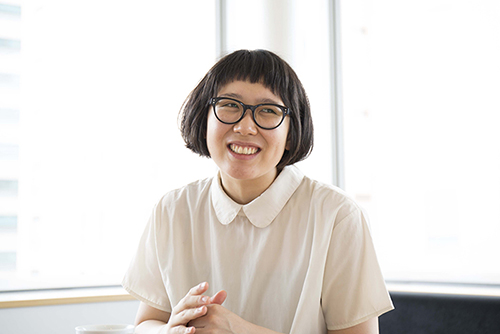
About MEDIA PRACTICE
"I think it's only possible with the right people."
- The official website for the Tokyo University of the Arts graduation exhibition "MEDIA PRACTICE 2011-2012," in which you participated, achieved the remarkable feat of winning the Special Jury Prize at the Japan Media Arts Festival organized by the Agency for Cultural Affairs, an unusual feat for a university graduation exhibition website. Where did the idea of creating a theme song for the website come from?
Shibata: What was it, I think we were discussing it in the PR team, and we were probably boiling it down, but when we all started asking, "What should we do?", it just so happened that a lot of us liked music, so we were like, "Okay, let's make a theme song," and it was decided in a way that flowed in the direction of our preferences... (laughs)
— It was like we had a mutual friend in music who helped us overcome the difficult situation at the time (laughs).
Shibata: I think I just liked sessions and wanted to do them, but I think I was stuck on how to promote it. As I felt that the way we had been doing things wasn't going to work, we started talking about songs, and decided to make a theme song, so we got together and had a night of sessions in the middle of the night. By chance, we were talking about making a song with obscene dialogue, and a fragment of that song came out, and we thought it would be good. So we wrote the song, and before we knew it, it became that kind of website.
–So in a sense it was born out of a dire situation.
Shibata: Yes, but I don't really remember that process.
But rather than trying to write a song from the get-go, it seems like you were just trying to find a way to make a difficult situation more enjoyable, and that's what came out of that.
Shibata: Yes, I think that's what it was like.
— Putting the songs at the forefront rather than the exhibit content...lol
Shibata: (laughs) I'm glad it worked out in the end. I think everyone thought we'd made a great song... Like, "This is really good."
— But you ended up winning the award!
Shibata: It's amazing, isn't it? I was surprised that it got such a big response... Everyone worked hard on the videos and recordings, but we weren't thinking about awards or anything, and when we released it, it got a big response mainly on Twitter. That's amazing, I was surprised when famous people tweeted about it, because I thought it had an immediate effect.
— It seems like there were a lot of tweets along the lines of, "What is this?!" rather than "It's good."
Shibata: I got an email from the person who made the website saying, "The number of hits is amazing!" I remember feeling happy. Also, it seems that people listened to the songs until the end, so the time spent on the site was really long. (With deep emotion) Those were good days...
— As for how the MEDIA PRACTICE website came about, the only thing I can say is that we had the right person.
Shibata: I really think that's the case. But I guess that's just how it is. I think it's only possible with the right people.
□About the Live
"I'm really blessed and I'm glad that I've had a good life."
— Are there any musicians who influenced you?
Shibata: I really can't think of anything like that... Yuming or Seiko Matsuda... I'm not a fanatic at all.
- You've worked with many famous people up until now, and this time you'll be performing with Seiichi Yamamoto at Chanoir in Hinodecho on Sunday, June 2nd. What led you to perform together with Yamamoto?
Shibata: When I met Yamamoto-san after participating in an album by a unit called Ya-to-i , I asked him to do it.
Ah! But the answer to the previous question might be Yamamoto-san. I've liked him since high school.
— So that's what I thought.
Shibata: I love it. The first time I listened to Yamamoto-san was on an album called "Nazonazo" where he played and sang, and it really made an impact on me. A friend lent it to me, and even now I listen to "Nazonazo" whenever I get the chance. I love it.
— This upcoming concert is a truly happy one for me, as I get to perform with someone I like so much.
Shibata: It feels like a dream. It feels like it every day, but I'm really blessed and I'm happy to think that my life has been good.
-Speaking of your joint live performances with Yamamoto-san, do you ever sing together?
Shibata: It's still kind of undecided.
— I know we cut off the conversation earlier, but what was the opportunity that led to you getting involved with ya-to-i?
Shibata: There was someone who helped us with PR from the first album, and that person had a deep connection with Moonriders, so when ya-to-i decided to get back together, they reached out to us through that person. I was so happy.

□About the performance works
"I think having words is a precious thing."
— Changing the subject, I'm sure you performed well when you were a student, but how is it these days?
Shibata: Lately, I haven't been doing anything close to that style.
- I've seen it a few times, but the performance has a strong theatrical element, and I think that people who only have the impression of Shibata singing normally will be surprised by the content, saying "Oh, Shibata-san does this too." Is there a difference between the Shibata-san who writes songs and the Shibata-san who performs?
Shibata: I don't know if this answers the question, but the performance I did for my graduation project was a bit contrived... I thought I couldn't do that unless I did it on purpose, and it's made me feel a bit uncomfortable about it lately, so I've been moving away from performance. No, rather, I want to think that expressing myself is not important... I think I'm still clinging to myself, but I want to be like that in the future. I think it's still the same now, but I think the mysterious aspects of humans and animals are great. Living things are mysterious... and so on. Strange things happen all the time. I think they have something like telepathy... and so on.
— In order to explore that area of interest, you did both music and performance, but did you ever feel like something was off with the performance?
Shibata: No, more than that, I think that at school there was a lot of freedom and people could watch whatever I did and it worked, but when I went out, it was a little different. I can sing, but I feel like that kind of performance would be no good if it seemed artificial, forced, or fake when I went out, so I can't do it now.
— A gallery has the sense of being a place to do that sort of thing, but a university is more of a classroom than an exhibition space, so perhaps that type of space was just right.
Shibata: No, I think that was probably just me being spoiled. That's why I think we were able to do it with that level of quality.
— If there was a space, would you like to perform again?
Shibata: I feel like it would be nice if I could come up with something clever that I could do naturally... Even if I say "naturally," I don't think there's anything like that from the beginning, and I don't know how to do it, but I think that my interest is not wrong, so I'm just going to explore the direction. Right now, I'm trying to figure out what it would be like to do it in the most interesting way in a place like that.
— I thought that even though you add music and lyrics to a song, there are still parts that you can't fully express, and that's what you let out through your performance.
Shibata: I think there's a simpler way. I think having words is valuable. I've been thinking lately that it's all about words. But I don't think that's the case. It's a back and forth thing. Either way, I think the only thing I can do is keep producing things that feel right.
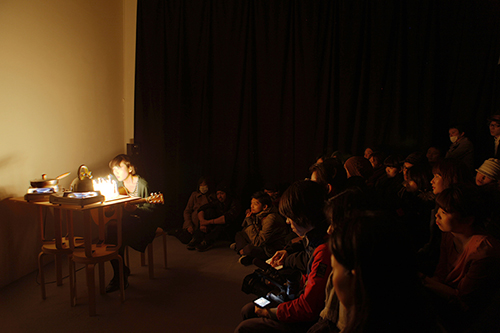
Performance: "Illustrated: Resonating with each other: the sixth sense of dogs and children" / 2012
— Personally, I really love Shibata's performance.
Shibata: Really? I really can't stand being anything other than singing. Like this kind of state. The other day, I submitted a piece of writing somewhere, and someone said it sounded like "depersonalization," so I looked into it, and it scared me because I thought the symptoms were quite similar to my own. I have this strange objectivity, like there's another me watching me, and I feel like there are about three of us watching each other all the time. But when I'm singing, it's easy and not too forced, but when I'm talking, it's the worst.
What about when you're writing lyrics?
Shibata: I don't usually write poetry, but I do write in my diary. I guess it's when I'm writing my diary or singing that I can accept myself as I am.
— Isn't that quite tiring?
Shibata: It's tiring. So there are nights when I feel like I can't do anything... Ah, but even though I say that, I live a carefree life (laughs).
When you write a song, do you write the lyrics first or the melody first?
Shibata: Sometimes the music comes first, sometimes the lyrics come first, and of course sometimes they come at the same time. It really varies, but it's difficult to write lyrics for someone else's music.
— It's not a sound that came from me.
Shibata: I don't know how to express words at all, and I simply can't put words that have meaning. I once wrote lyrics for a new song for the re-activation of a unit called Ya-to-i, but the lyrics were almost meaningless, and I wrote them just for the sound. In the end, I think I came up with a fragment of my own meaning... I remember telling Toru Okada (note: member of Ya-to-i and keyboardist of Moonriders) that I couldn't write lyrics at all, and he told me, "There are probably words that contain the melody, so do your best." In the end, I wrote until about 10 minutes before adding the rough vocals. I didn't know which one was good.
□ What I'm obsessed with right now
— What are you most into right now?
Shibata: I don't really have any hobbies, but maybe recording...
Do you try out different equipment?
Shibata: Yes, I'm trying out a lot of different things. I don't have enough to collect, but I think now is the time to spend money. When I spend money, I get high and it's a lot of fun (laughs).
— I feel like I'm listening to an incredible confession (laughs).
Shibata: No, I haven't spent that much, but I feel like I'm pretty much broke.
--What's your favorite thing you've ever bought?
Shibata: The most fun thing was buying the AKG microphone. It's the only microphone I have, and it's become the standard for my sound, so it's fun to try other ones. I didn't really have a good sound until now, but now I have one. Oh, I was lent a guitar recently, and it was handmade and really cute.
You've been experimenting with different sounds lately.
Shibata: It felt like I was finally aware of it.
□ Recommended spots in Kanagawa
— This is the last question. What are your recommended spots in Kanagawa Prefecture?
Shibata: There's a 24-hour Chinese restaurant in Yokohama called "Chuka Ichiban," and whenever I'm drinking in Yokohama, I always drift off and end up there. It feels like I've been poisoned, but I like it (laughs). It's just so cheap, even if we go drinking together, it's only 800 yen per person! When I run out of places to go, that's the place to go. I've been going there so much that it's like I'm addicted (laughs).
--Please tell us what menu items you recommend, Mr. Shibata from Chuka Ichiban.
Shibata: Paiko fried rice!! I was told that I had to try the Paiko fried rice first, so I did. I also recommend the pork cutlet curry.
–I'll try it next time! Thank you for today!
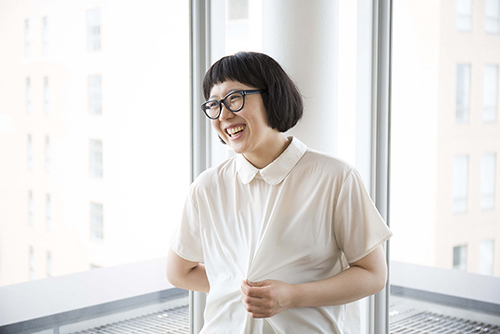
Date and time: Sunday, June 2nd Performance starts at 19:00 (doors open at 18:30)
Location: Hinodecho Chanoir (1-76-1 Hinodecho, Naka-ku, Yokohama)
Price: 2,000 yen in advance / 2,500 yen on the day (plus one drink order)
Cast: Satoko Shibata, Seiichi Yamamoto
Reservations: Phone: 045-242-9784 (18:00-24:00 *Closed on Sundays)
<This event has ended.>
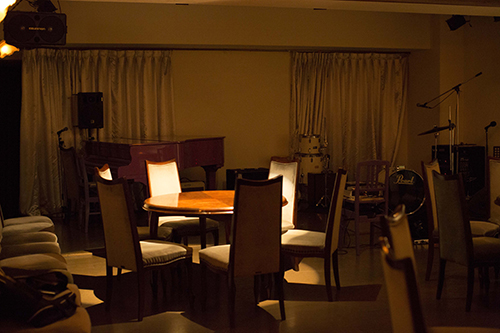

In fact, Shibata sometimes works at the bar as "BAR Satoko" on an irregular basis.
If you'd like to meet them in person, it might be a good idea to check the schedule on their website and aim to go on that day.
(Editor's note)
The interview was in the morning, so after parting ways with Shibata, I immediately went to "Chuka Ichiban" for my interview. The restaurant has been in business for 52 years, and the exterior is impressive, but the sign reads "Open 24 hours, when the food tastes good." When I entered the restaurant, it was already past 1pm, but it was full, and the faint scent of the Showa era made me feel like I had traveled back in time. Shibata's recommended paikomen and katsu curry were very filling. In fact, they were single items. The set also came with a half-sized ramen and a poached egg for an additional 100 yen. It's an unbelievable price. The taste is quite addictive, and it's easy to see why people keep coming back. "Chuka Ichiban" has maintained the same taste since it first opened.

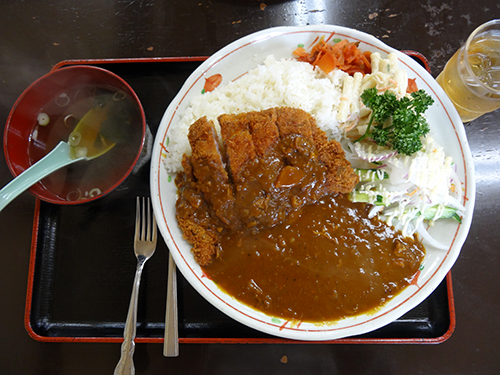
■ Chuka Ichiban Main Store (3-43 Akebono-cho, Naka-ku, Yokohama, Kanagawa Prefecture)
Phone: 045-261-0968
Access: 5 minutes on foot from the municipal subway "Bandobashi Station" / 260m from Bandobashi Station
